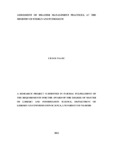| dc.description.abstract | Disaster is a common phenomenon that can happen when least expected and it often
comes unannounced with disastrous consequences.
Disasters are frequently happening
around the world and organizations need to focus on risks that can affect and disrupt
their normal functioning
by taking mitigation measures.
No organization may want to
be out of business for any reason at this competitive era as this can cause losses in
terms of finances
and reputation.
The aim of the study was to investigate disaster
management practices in the
Ministry of Energy and Petroleum, Nairobi. The
study
objectives were to find out existence of disaster management policy in the Ministry of
Energy and Petroleum; find out types of disasters likely to occur; establish the state of
disaster preparedness; determine the role of information communication technology
(ICT)
in disaster management; establish challenges faced by staff in
regard to
disaster
preparedness. The study was conducted in
the Ministry of Energy and Petroleum
headquarters, which is located at
Nyayo House, Kenyatta Avenue, Nairobi, Kenya.
Both qualitative and quantitative
research
approach
es were applied.
The target
population
for the study
was 208 members of staff
from the Ministry of Energy and
Petroleum. Sample size of 64 was selected comprising top management, middle level
managers, supervisors, clerks and staff working in resource centres. Purposive
sampling
technique
was used to
select sample size because the study targeted a
particular group of people.
The study applied various data collection instruments
namely unstructured/structured questionnaires, documentary source and observation.
Data
was coded, classified, analysed and presented in tables, pie charts,
graphs and
descriptive form by use of Microsoft
Word and Microsoft
Excel.
The
research key
findings
revealed
that there is
no disaster management policy or plan in the Ministry
of Energy and Petroleum. In addition the
measures taken to mitigate and prepare for
disaster
are
in
adequate.
The researcher
recommended that
the
Ministry of Energy and
Petroleum should formulate disaster management policy,
train staff,
create awareness
and allocate adequate funds for disaster management.
The research
findings
would be
valuable to the Ministry of Energy and Petroleum and the public sector, policy makers
as it will give them basis for embracing disaster management | en_US |

